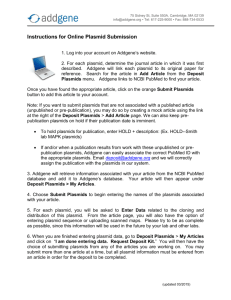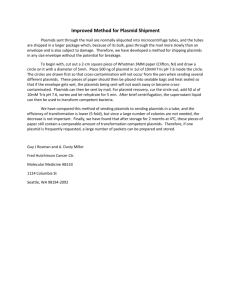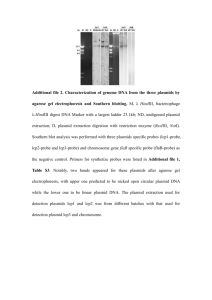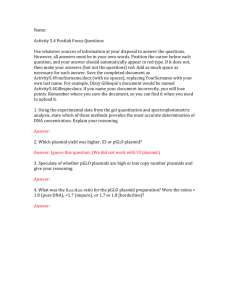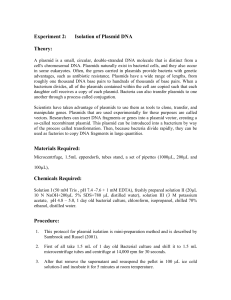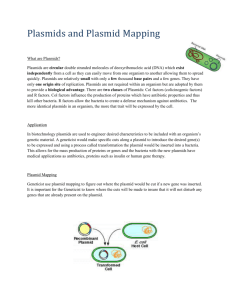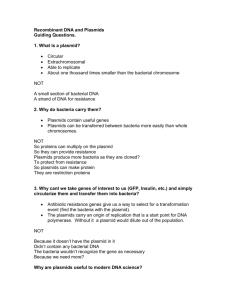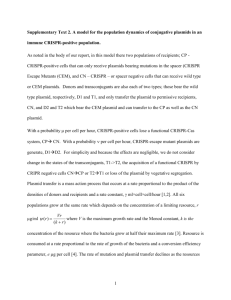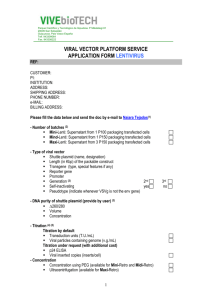Got any Plasmids?
advertisement
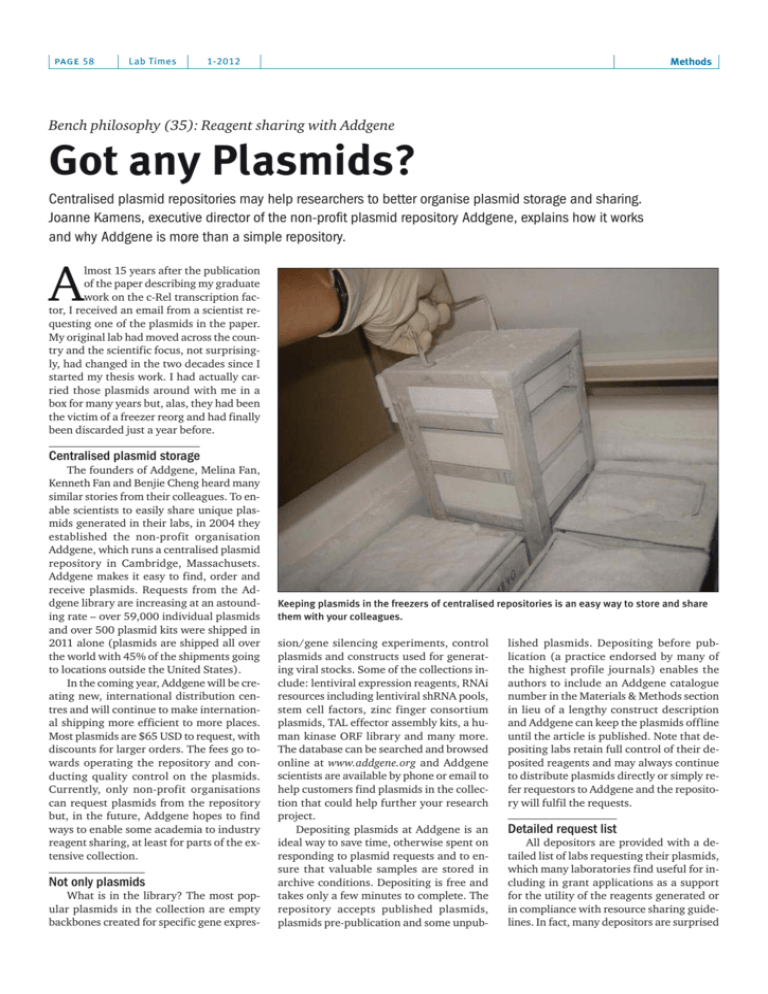
page 58 Lab Times 1-2012 Methods Bench philosophy (35): Reagent sharing with Addgene Got any Plasmids? Centralised plasmid repositories may help researchers to better organise plasmid storage and sharing. Joanne Kamens, executive director of the non-profit plasmid repository Addgene, explains how it works and why Addgene is more than a simple repository. A lmost 15 years after the publication of the paper describing my graduate work on the c-Rel transcription factor, I received an email from a scientist requesting one of the plasmids in the paper. My original lab had moved across the country and the scientific focus, not surprisingly, had changed in the two decades since I started my thesis work. I had actually carried those plasmids around with me in a box for many years but, alas, they had been the victim of a freezer reorg and had finally been discarded just a year before. Centralised plasmid storage The founders of Addgene, Melina Fan, Kenneth Fan and Benjie Cheng heard many similar stories from their colleagues. To enable scientists to easily share unique plasmids generated in their labs, in 2004 they established the non-profit organisation Addgene, which runs a centralised plasmid repository in Cambridge, Massachusets. Addgene makes it easy to find, order and receive plasmids. Requests from the Addgene library are increasing at an astounding rate – over 59,000 individual plasmids and over 500 plasmid kits were shipped in 2011 alone (plasmids are shipped all over the world with 45% of the shipments going to locations outside the United States). In the coming year, Addgene will be creating new, international distribution centres and will continue to make international shipping more efficient to more places. Most plasmids are $65 USD to request, with discounts for larger orders. The fees go towards operating the repository and conducting quality control on the plasmids. Currently, only non-profit organisations can request plasmids from the repository but, in the future, Addgene hopes to find ways to enable some academia to industry reagent sharing, at least for parts of the extensive collection. Not only plasmids What is in the library? The most popular plasmids in the collection are empty backbones created for specific gene expres- Keeping plasmids in the freezers of centralised repositories is an easy way to store and share them with your colleagues. sion/gene silencing experiments, control plasmids and constructs used for generating viral stocks. Some of the collections include: lentiviral expression reagents, RNAi resources including lentiviral shRNA pools, stem cell factors, zinc finger consortium plasmids, TAL effector assembly kits, a human kinase ORF library and many more. The database can be searched and browsed online at www.addgene.org and Addgene scientists are available by phone or email to help customers find plasmids in the collection that could help further your research project. Depositing plasmids at Addgene is an ideal way to save time, otherwise spent on responding to plasmid requests and to ensure that valuable samples are stored in archive conditions. Depositing is free and takes only a few minutes to complete. The repository accepts published plasmids, plasmids pre-publication and some unpub- lished plasmids. Depositing before publication (a practice endorsed by many of the highest profile journals) enables the authors to include an Addgene catalogue number in the Materials & Methods section in lieu of a lengthy construct description and Addgene can keep the plasmids offline until the article is published. Note that depositing labs retain full control of their deposited reagents and may always continue to distribute plasmids directly or simply refer requestors to Addgene and the repository will fulfil the requests. Detailed request list All depositors are provided with a detailed list of labs requesting their plasmids, which many laboratories find useful for including in grant applications as a support for the utility of the reagents generated or in compliance with resource sharing guidelines. In fact, many depositors are surprised Methods to see how much more use their plasmids get when they can be easily found in the searchable database and how this leads to additional publications and citations of the original paper. Consider also the value in archiving plasmids from a published paper when the first author graduates or moves on after a post-doctoral rotation. A deposit to Addgene of those published reagents ensures that no one will ever have to scour through the ice at the bottom of a freezer to find and ship a plasmid made by someone who is no longer in the lab. Reading “inherited” tubes Plasmid repositories also serve a key function in archiving the information about these reagents. Open sharing of information has become increasingly important as methods sections shrink or become buried in supplemental documents. However, archiving plasmid information can be a challenge – epitope tags, protein domain delineations, or backbone information can become lost in labs due to the natural turnover of researchers. The viral video parody called “Bad Project” put together by the Zheng lab at Baylor (www.youtube.com/ watch?v=Fl4L4M8m4d0) has one especially funny scene when a lab member struggles to read a set of “inherited” tubes with labels written in a foreign language. Watch this video because it is hilarious (especially when “Lady Gaga” dons an outfit made of spill pads) but it isn’t so funny when it is your project that requires the use of a mystery plasmid. Addgene allows scientists to easily enter and share data on its website, ensuring that both the plasmid and the cloning information will be preserved for both the depositing lab and for the research community. In addition to archiving plasmid specifications, checking the accuracy of that information is equally important. Addgene sequences the cloning junctions, mutated sites and other key regions of every plasmid that it receives and works with the depositing lab to verify accuracy. The sequencing data is then posted on its website for the benefit of the community. 1-2012 Lab Times page 59 Decrypting labels from “inherited” plasmid tubes can be a real pain. With a change in the way the federal government handles patenting and licensing of materials generated by public funds, there has been an increase in the use of MTAs throughout the academic community. Unfortunately, MTAs can often be the cause of long delays for the researcher looking to obtain resources quickly. Addgene made great strides by developing one of the first electronic MTA systems, which expedites the MTA process considerably. This system has streamlined the process by standardizing the agreements as much as possible across all institutions and by allowing for electronic signatures from institutions, both contributing and requesting materials. It is in place since the company’s inception and has been used for over 80,000 orders from over 2,500 institutions worldwide. As more university technology transfer offices have adapted to this regime over the years, time for MTA approval has been halved, with the median time now less than 36 hours. The system also tracks who obtains plasmids from Addgene’s collection, thus providing a record for scientists and Technology Transfer offices of the whereabouts of their materials. Labs strive to uphold high standards for resource characterisation, data retention and reagent sharing but it is often difficult to do so from a logistical standpoint. By archiving and distributing valuable, unique reagents and streamlining the often cumbersome legal paperwork involved in technology transfer, repositories like Addgene can improve both reproducibility and productivity in research. Joanne Kamens Streamlined MTAs The Addgene repository solves another barrier to efficient reagent sharing – the delays that result from an increased use of Material Transfer Agreements (MTAs) for reagent transfer between academic and other non-profit organisations (Cormier et al., J. Nucleic Acids Res. 38, D743-749 (2010)). Fancy composing an installment of “Bench Philosophy”? Contact Lab Times E-mail: editors@lab-times.org
